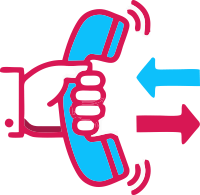eWayBill APIs
Generate eWayBill through your existing Software/ERP in just 1 click with FREE eWayBill DLLs & LIBs.
How eWayBill works?
1 Click eWayBill from your existing ERP/Software
Also, eWayBill integration is trivial for ASPs / ERP Developers using eWayBill APIs and Free Java Library or .Net DLLs offered FREE by TaxPro GSP.
No onboarding Charges! Free Integration support!!

Any ERP on Any Platform
Our value added eWayBill APIs takes care of Json Invoice Data Encryption, Decryption, Digital Signing and Invoice Verification requirements. Also provides custom image formats and size for eInvoice QR Code genration.

Easy & Quick Integration
No need to call AuthToken API. eInvoice libraries internally checks for valid AuthToken, and refreshesh AuthToken internally and transperantly to user. Just couple of hours of your time, and you are ready to go. Source code of Integration projects available for Download

White labelled Panel
White labelled or own labelled eWayBill API url and CRM to manage number of Resellers, Sub-resellers, and clients from single ASP login.
Web application to manage pre-paid ASP accounts, API recharges, API uses summary.

On-call Expert Support
Our dedicated support and integration experts are available throughout the process of Integration and further ongoing support to help address functional and technical queries in day to day use. Google Group to Notify updates.
Get our FREE Java or .Net DLL/Library today!
eWayBill Functions Available as API
Get eWayBill APIs
- Consolidated eWayBill
- eWayBill Generated by Others
- List of eWayBills generated by other parties in your name - based on generation date
Generate eWayBill APIs
- Consolidate eWayBill
- eWayBill
Modify eWayBill APIs
- Update Vehicle # to eWayBill
- Cancel eWayBill
- Reject eWayBill
eWayBill FAQs
A WayBill is a receipt or a document issued by a carrier giving details and instructions relating to the shipment of a consignment of goods and the details include name of consignor, consignee, the point of origin of the consignment, its destination, and route.
Electronic Way Bill or eWayBill is basically a compliance mechanism wherein by way of a digital interface the person causing the movement of goods uploads the relevant information prior to the commencement of movement of goods and generates eWayBill on the GST portal.
eWayBill is an electronic document generated on the GST portal evidencing movement of goods. It has two Components-Part A comprising of details of GSTIN of recipient, place of delivery (PIN Code), invoice or challan number and date, value of goods, HSN code, transport document number (Goods Receipt Number or Railway Receipt Number or Airway Bill Number or Bill of Lading Number) and reasons for transportation; and Part B comprising of transporter details (Vehicle number).
As per Rule 138 of the CGST Rules, 2017, every registered establishment which causes movement of goods (which may not necessarily be on account of supply) of consignment value more than Rs. 50000/- is required to furnish above mentioned information in part A of eWayBill. The part B containing transport details helps in generation of eWayBill.
eWayBill is to be generated by the consignor or consignee himself if the transportation is being done in own/hired conveyance or by railways by air or by Vessel. If the goods are handed over to a transporter for transportation by road, eWayBill is to be generated by the Transporter. Where neither the consignor nor consignee generates the eWayBill and the value of goods is more than INR 50,000.00, it shall be the responsibility of the transporter to generate it.
Further, it has been provided that where goods are sent by a principal located in one State to a job worker located in any other State, the eWayBill shall be generated by the principal irrespective of the value of the consignment.
Yes. Validity of the e-way bill or consolidated e-way bill depends upon the distance the goods have to be transported. The validity is one day up-to 100 km and for every 100 km or part thereafter it is one additional day.
Yes, it can be different date for eWayBill than that of the Invoice. eWayBill date is the date on which the eWayBill is generated.
If eWayBills, wherever required, are not issued in accordance the provisions contained in rule 138, the same will be considered as contravention of rules. As per section 122(1) (xiv) of CGST Act a taxable person who transports any taxable goods without the cover of specified documents (eWayBill is one of the specified document) shall be liable to a penalty of INR 10,000.00 or tax to be avoided, whichever is greater.

